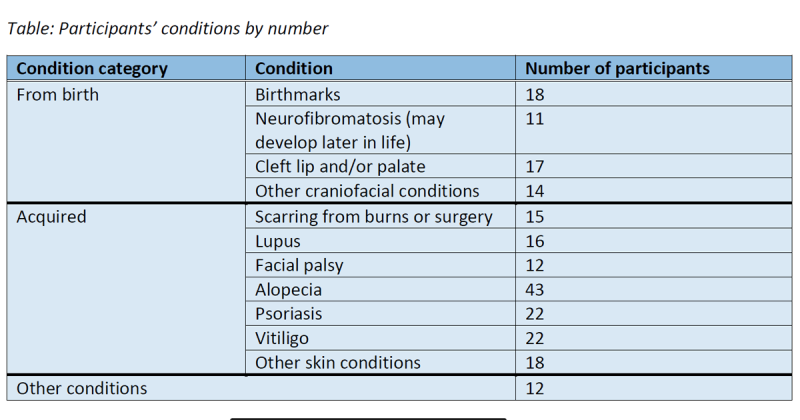Looks and Life: A summary of the study
23 August 2019
Looks and Life: A summary of the study
What we wanted to learn
We were interested in how people with a health condition that affects their appearance deal with difficult thoughts and feelings about their appearance. We know from previous research that some people avoid activities that they expect will bring up difficult thoughts and feelings, and some spend a lot of time and energy covering, concealing and focusing on their appearance. We wanted to learn more about two mental tendencies: (1) a desire to get rid of or avoid difficult thoughts and feelings (called ‘experiential avoidance), and (2) getting caught up with difficult thoughts (called ‘cognitive fusion’). Specifically, we wanted to know whether these two tendencies might explain why people with conditions that affect their appearance are more or less likely to (a) avoid stressful appearance-related activities, and (b) to cover, conceal and focus on their appearance.
What we did
To do this, we asked charities and organisations from the Appearance Collective to help us recruit participants across a wide range of appearance-affecting conditions (a breakdown by condition type is given below). Thanks to these organisations, we surveyed 220 adults, aged 18-75, just under 80% of whom were female. Participants completed demographic questions, a series of validated psychological questionnaires, and gave details about how their condition affects their appearance. We ran statistical analyses called Mediation analyses, to find out how well (1) experiential avoidance and (2) cognitive fusion statistically explained participants’ tendency to (a) avoid stressful appearance-related situations and (b) cover, conceal and focus on their appearance. In the analyses, we took account of participants’ age, gender, how visible they perceived their different appearance to be to others, and whether their condition was acquired or from birth.
What we found
We found that participants’ level of (1) experiential avoidance (a tendency to try and get rid of or avoid difficult thoughts and feelings) did partly explain their tendency to (a) avoid stressful appearance-related situations. The more experientially avoidant they were, the more likely they were to avoid stressful situations. Experiential avoidance didn’t, though, explain participants’ tendency to (b) cover, conceal and focus on appearance. On the other hand, participants’ level of (2) cognitive fusion (getting caught up in thoughts) explained both (a) avoiding stressful situations and (b) cover, concealing and focusing on appearance. The more participants were caught up in thoughts, the more they’d avoid stressful situations, and the more they’d cover, conceal and focus on their appearance.
What this means
We now know that these two mental tendencies are likely to play a role in how people cope with difficult thoughts and feelings about their appearance. Many types of psychological therapy (like traditional cognitive behavioural therapy) try to help people manage distress by teaching them to change their thinking patterns from less rational to more rational. What the findings of the study suggest is that they may be another way: Learning to just observe thoughts as thoughts rather than facts (‘cognitive defusion’) and learning to open up to and tolerate difficult thoughts and feelings (‘experiential acceptance’), without trying to change those internal experiences, may help people with appearance-affecting conditions engage more in meaningful activities that they may otherwise avoid. An approach called Acceptance and Commitment Therapy (or ‘ACT’) focuses on developing cognitive defusion and experiential acceptance, and we at CAR are currently developing a self-help programme based on ACT that we would like to test in the near future.

Filter News
_2_800_600_s_c1.jpg)
NF & Sport: Joy’s Journey
Find out more about the impact of sport on Joy's NF1 journey & how running changed her life forever.
Read More_5_800_600_s_c1.jpg)
Safiya’s NF1 Journey
Find out more about Safiya & how her NF1 diagnosis has made her 'determined to make a difference'.
Read More_1_800_600_s_c1.png)
The Boy Who Played Cricket
Take a look behind the scenes of team NTUK's visit to the 'The Boy Who Played Cricket' opening.
Read More_800_600_s_c1.jpg)
Ella’s Story
Ella shares her insights into campus life with NF; her victories & hurdles & the importance of self- belief.
Read More
Oliver’s Blog
Oliver Bromley shares some personal experiences of visible difference, and how education and kindness can reduce stigma.
Read More_2_800_600_s_c1.jpg)
3BM & Fusion’s Purple Forum nominate Nerve Tumours UK as their Charity of the Year
Take a look inside Purple Forum and how they're raising awareness and funds for the NF community.
Read More_2_800_600_s_c1.jpg)
George, Alisya’s & Leo’s NF1 Story
Find out how George and his team at Rolls Royce are raising NF awareness because of NF hero Leo.
Read More_800_600_s_c1.jpg)
World NF Awareness Month 2025: In Review
A look back at some of the highlights of World NF Awareness Month, May 2025.
Read More_1_800_600_s_c1.jpg)
Emily Owen: World NF2 Day
Our charity Ambassador offers her thoughts and guidance on NF2 day
Read More
